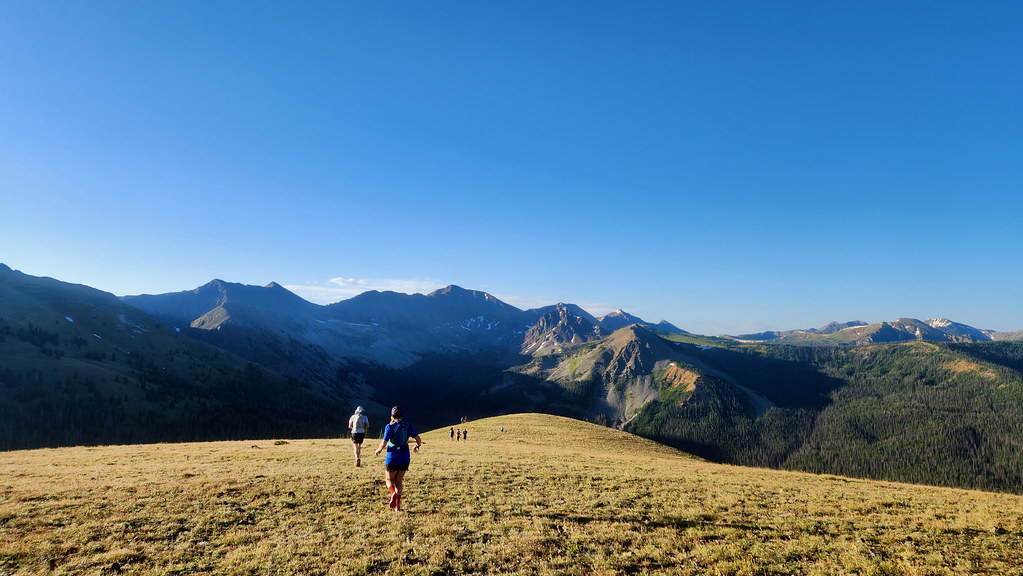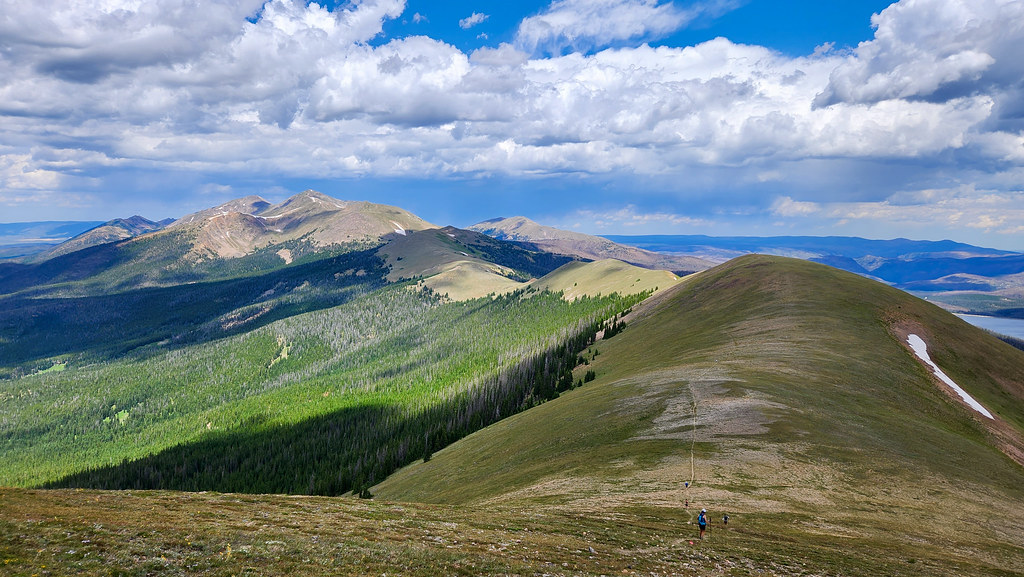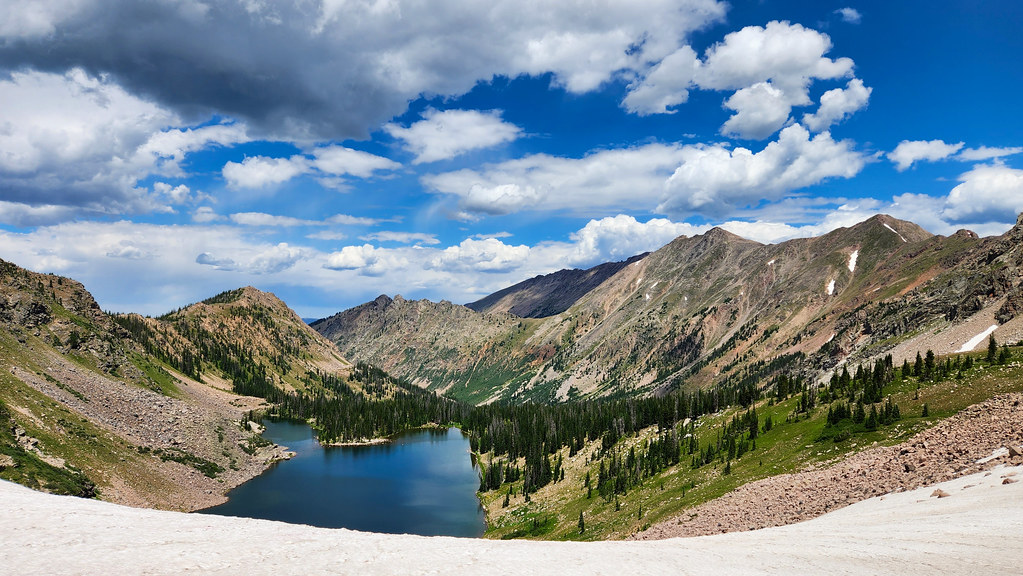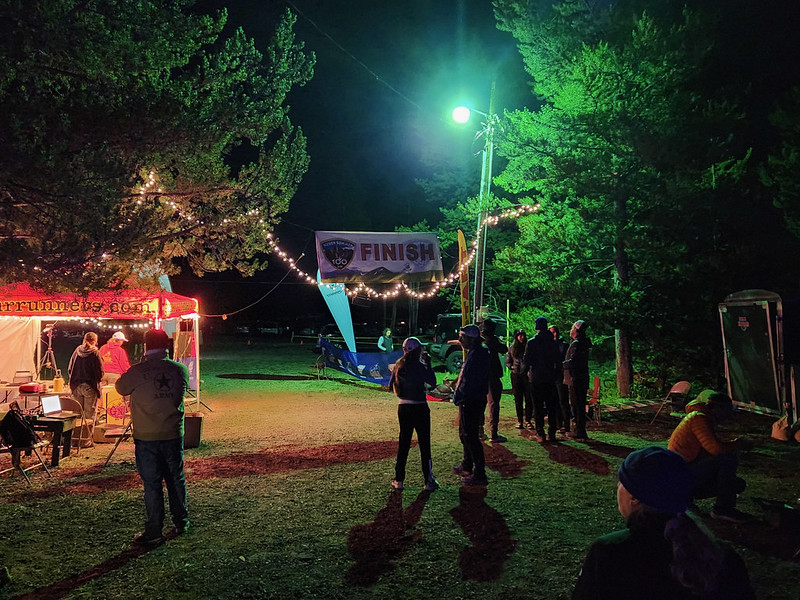Never Summer training weekend recap
Thursday, July 27, I drove west on CO-14 up the long Poudre River canyon and over Cameron Pass to Gould, the base for the Never Summer 60K and 100K races, for three days of camping and running in the mountains. Friday I would run the 60K race, Saturday I would go out for a few hours in the morning, and Sunday I would run a few more hours before driving home. Back-to-back-to-back easy long runs at high elevation to help me get in shape for the Bear 100 in September.
I had completely fair weather for the drive and for setting up my tent. I tossed a drop bag with spare shoes and socks in the truck bound for the Bockman aid station, caught up with other runners who I haven't seen in a while, cooked some quinoa for dinner, and tucked myself in.

Nokhu crags from Cameron Pass on CO-14
Thunderstorms passed over Gould almost all night long. I slept fitfully, and struggled to get my act together before the 5:30 a.m. start. I tied my shoes in the last 30 seconds before race director Nick Clark let us go. Not being a morning person, getting to the start on time is always a challenge for me.
After two miles of rolling along the margin of the valley floor, the course climbs steeply up Seven Utes Mountain. I stopped feeling groggy and started feeling the effort. I hiked the whole thing, comfortable at the back of the pack, and in a little over an hour, I was on top of the first alpine summit.

Runners heading down from the summit of Seven Utes Mountain, mile 6
My plan for the day was to go at an average pace of 20 minutes per mile. At the Bear 100, this would equate to a 33 hour finish, comfortably within the 36 hour cut off. I got to the Michigan Ditch aid station (11 miles) ahead of schedule and reached the Diamond Peak aid station (19 miles) 45 minutes ahead of schedule. The segment between them climbs 1000 feet, then becomes a highly runnable downhill. I ate solid food at the aid station, filled some pockets with cookies, and took 3 soft bottles of VFuel (race sponsor) solution to get me through the Diamond Peak climb and the ridge connection to Montgomery Pass.
Sweltering conditions made the first part of the Diamond Peak climb tough. A steady breeze above treeline helped make the slow, steep slog up the ridge more comfortable. The last unforgettable mile of the climb has a vertical gain of 1370 feet.

The ridge between North Diamond Peak and Montgomery Pass, mile 21
I took it easy on top, taking lots of pictures with my phone, and texting them to my family. News from the course always makes my mom happy. I reached the Montgomery Pass aid station a little less than three hours after leaving the Diamond Peak aid station.
I've been recovering from a back injury, perhaps from my crash at Kettle Moraine, and by the time I reached Montgomery Pass it had seized up. I wasn't able to do any consistent downhill running after this point. Still, seven hours of pain free running and hiking felt like major progress. I hope I'll be close to 100 percent by the Bear. I hiked down to Bockman aid station, did not change shoes and socks, grabbed more drinks and cookies, and hiked and jogged intermittently to the finish. I was just seven minutes over my goal.
Fort Collins runners Clint Anders and Jenna Bensko won the men's and women's divisions. Full results are here on OpenSplitTime.
Saturday morning I woke early to the sounds of the 100K race starting, dozed for another two hours, then drove 45 minutes to the Bockman aid station. It was dormant at 9. It is the 100K race's 50 mile mark and the first runner wouldn't be arriving before 2 p.m. From Bockman, I hiked the course in reverse to the Ruby Jewel aid station, then went forward on the course to the pass overlooking Kelly Lake, roughly mile 35. The lead runner and eventual winner, Zachary Russell, caught up to me just before the top. I stuck around to see the next ten runners come over, then headed back to Ruby Jewel. Saturday was warm, and the closer I got to Ruby Jewel, the more suffering I saw on faces. I heard later that 50 runners dropped out there at mile 31.

Pass above Kelly Lake, mile 35
I returned to Bockman, hung out there chatting with the aid station crew for a bit, then went for a swim in North Michigan Reservoir, a place where I've camped with my family, and which is full of water again after being drained for maintenance of the dam in 2021. After cooling and washing off, I returned to my camp at the race finish to change and get ready to work at the kitchen. From 6 p.m. until midnight I washed dishes and served food to runners. The kitchen group was a lot of fun and was lead by an actual chef who does the same duty at Hardrock 100 and a few other serious races. People are super grateful for a hot meal after a long day on the trail or at an aid station, and there isn't anywhere to eat in Gould. I would do this again.

100K finish line
I slept very little Saturday night. Runners trickled in until 6 a.m., and Brad Bishop (volunteer coordinator and finish line announcer among many roles) read every name and number over the PA system. On the bright side, I did hear names I knew, and was glad for them. My friend Ivan became the 100K race's first 70 year old finisher at 3:50 a.m.
After breaking camp and packing my car, I said good-bye to people, and drove homewards, stopping at the American Lakes trailhead for one more trip to that beautiful alpine basin. This time I went all the way to Thunder Pass for the view into Rocky Mountain National Park.

American Lakes basin from Thunder Pass
Over the weekend, I spent 20 hours on trails, covered 100 kilometers distance, and climbed over 4,000 meters. A successful mountain training camp, for sure. I got signs that my back is healing, did some volunteering, hung out with my favorite runners, and met some fun folks for the first time. I don't know if I'll run this next year, but I'll be back to be a part of it.